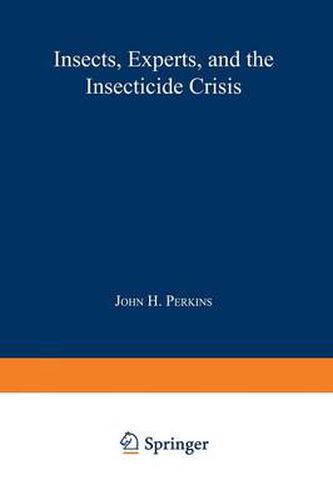Readings Newsletter
Become a Readings Member to make your shopping experience even easier.
Sign in or sign up for free!
You’re not far away from qualifying for FREE standard shipping within Australia
You’ve qualified for FREE standard shipping within Australia
The cart is loading…






This title is printed to order. This book may have been self-published. If so, we cannot guarantee the quality of the content. In the main most books will have gone through the editing process however some may not. We therefore suggest that you be aware of this before ordering this book. If in doubt check either the author or publisher’s details as we are unable to accept any returns unless they are faulty. Please contact us if you have any questions.
Science and technology are cultural phenomena. Expert knowledge is generated amid the conflicts of a society and in turn supplies fuel to fire yet further change and new clashes. This essay on economic entomology is a case study on how cultural events and forces affected the creation of scientific and technical knowledge. The time period emphasized is 1945 to 1980. My initial premises for selecting relevant data for the story were ultimately not of much use. Virtually all debates about insect control since 1945 have been centered around the environmental and health hazards associated with insecticides. My first but inadequate conclusion was that the center of interest lay between those who defended the chemicals and those who advocated the use of nonchemical control methods. With this formulation of the problem, I was drawn to an analysis of how the chemical manufacturers had managed to dominate and even corrupt the work of entomological scientists, farmers, members of Congress, and regulators in the USDA and EPA. My own contribu tions to a policy study at the National Academy of Sciences were based 1 on this premise. More recently, Robert van den Bosch developed the 2 corruption theme in considerable detail.
$9.00 standard shipping within Australia
FREE standard shipping within Australia for orders over $100.00
Express & International shipping calculated at checkout
This title is printed to order. This book may have been self-published. If so, we cannot guarantee the quality of the content. In the main most books will have gone through the editing process however some may not. We therefore suggest that you be aware of this before ordering this book. If in doubt check either the author or publisher’s details as we are unable to accept any returns unless they are faulty. Please contact us if you have any questions.
Science and technology are cultural phenomena. Expert knowledge is generated amid the conflicts of a society and in turn supplies fuel to fire yet further change and new clashes. This essay on economic entomology is a case study on how cultural events and forces affected the creation of scientific and technical knowledge. The time period emphasized is 1945 to 1980. My initial premises for selecting relevant data for the story were ultimately not of much use. Virtually all debates about insect control since 1945 have been centered around the environmental and health hazards associated with insecticides. My first but inadequate conclusion was that the center of interest lay between those who defended the chemicals and those who advocated the use of nonchemical control methods. With this formulation of the problem, I was drawn to an analysis of how the chemical manufacturers had managed to dominate and even corrupt the work of entomological scientists, farmers, members of Congress, and regulators in the USDA and EPA. My own contribu tions to a policy study at the National Academy of Sciences were based 1 on this premise. More recently, Robert van den Bosch developed the 2 corruption theme in considerable detail.